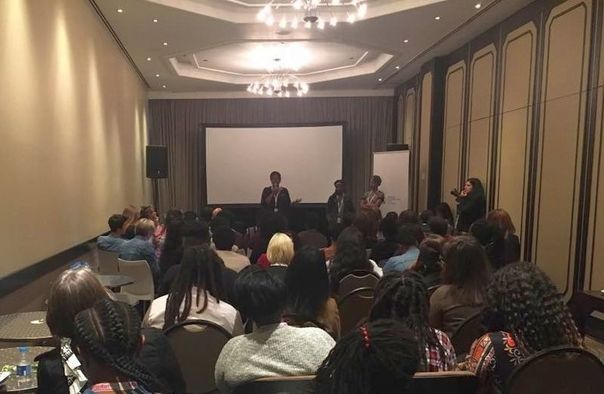#ThatsNotOk report: Women are not safe in South African film and TV industry
By Djia Mambu

The official launch and networking session of the Sisters Working in Film and Television group. Picture: Facebook.
A new report being prepared by women working in film and television in South Africa has been the talk of the 38th Durban International Film Festival this week. It reveals an industry in crisis, with 78% of women working in film and TV saying they are discriminated against because of their gender. And it gathers a huge number of accounts of sexual harassment, discrimination and even rape on film sets.
Although the final report will only be released later this year, its contents were revealed in various workshops and media briefings this week. Its contents pull back the veil of magic around the world of cinema to reveal that women both on camera and behind the camera face often insurmountable obstacles to succeeding.
Formed last year in Durban to address the crisis of masculinity in film, the report is being compiled by SWIFT (Sisters Working in Film and Television) who launched officially here on Sunday. The report contains the results of a poll conducted with women in film between January and April this year. The poll included space for comments, which, when read out, left women in the sessions reeling – and elicited numerous similar accounts from the room.
Some of the experiences documented include:
• “Touching my face, or by ‘mistake’ touching my breast. I’ve even once had someone touch my ass, again saying it was meant as a joke.”
• “I was told by my direct superior (a woman) to sleep with one of our international clients. When I (aghast) refused, she said: “Oh be a sport, he is going through a divorce and we must show him a good time.”
• “I’ve had male crew members making sexist comments and asking me if they can visit me in my room at night especially when shooting out of town.”
• “What frame rate can this camera do? Well, that depends on resolution. At (X) size, the camera can shoot (Y) frames per second. You have tits, obviously you don’t understand the question.”
• “A young lady on set blacked out with other crew members present. When she awoke she had pain and suspected rape. The producer told her it’s her own fault and fired her for going to the hospital for a rape kit.” Another woman indicated that she had definitely been raped at work.
Of the 76 women polled, 23.7% indicated that they had been unwillingly touched while working in the industry; 65% signified that they had witnessed sexual harassment by a perpetrator in a higher position (plus 30% in an equal position and 5% in a lower position). Of the 54.8% of respondents who intervened to stop the harassment, 27% say that they risked their job to do so. And 41.3% of respondents felt they had experienced discrimination based on their body image related to their body size or “look”. A remaining 55.5% indicated that they had felt discriminated against based on factors such as sexual orientation, religion, family life and income bracket.
Of the women polled, 68.1% believed that they had to work twice as hard and be twice as good as their male counterparts in the industry.
In addition to gender, 58% of respondents said they had been discriminated against based on their race.
In response to the crisis, SWIFT has launched a campaign called #ThatsNotOk and with it a series of short video public service announcements acting out real-life incidents from the poll.
SWIFT is concerned that women have nowhere to take their complaints and so the networking and advocacy organisation is calling for a code of conduct to be included in contracts, as well as looking at a partnership with the Lawyers for Human Rights. They are establishing a gender department to offer pro bono legal advice to women reporting sexual abuse.

